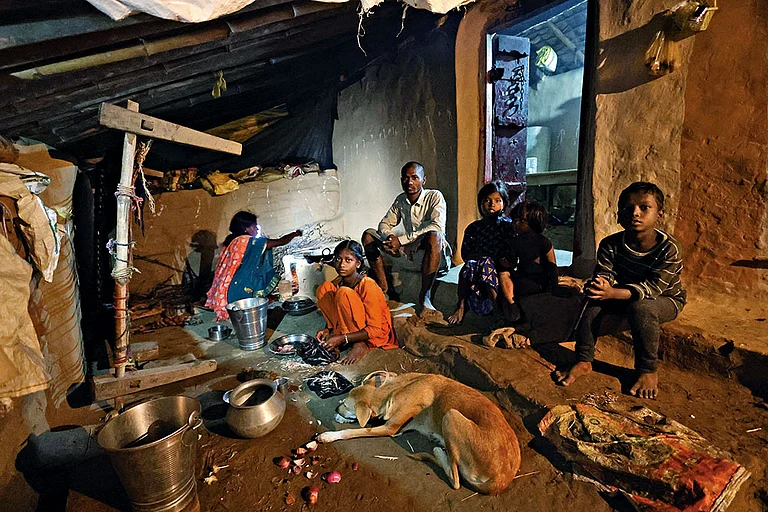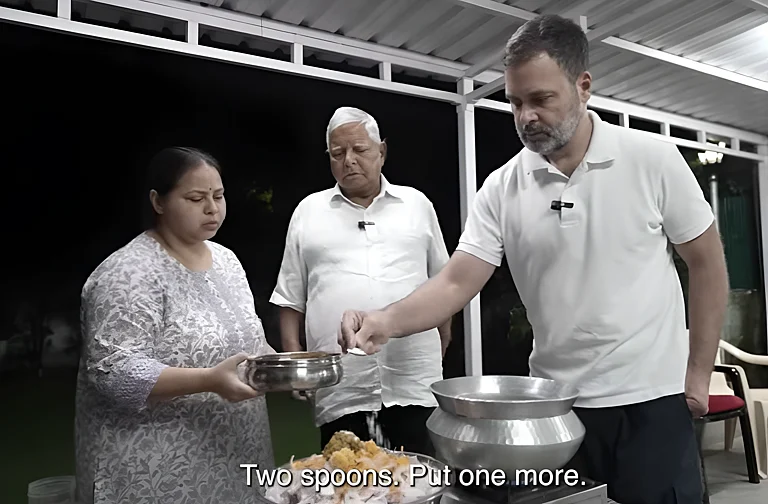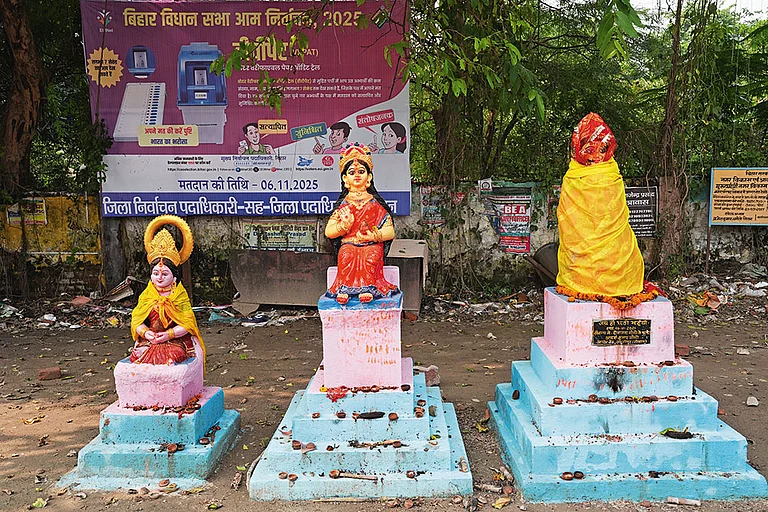In Bihar’s election season, Extremely Backward Castes (EBCs) have become the key vote bank courted by all parties.
Nitish Kumar’s ₹10,000 “Dus-Hazaari” scheme for women has boosted NDA’s appeal, though critics call it an election bribe.
The Mahagathbandhan, led by Tejashwi Yadav and backed by Mukesh Sahani’s VIP, challenges Nitish’s “sushasan” amid BJP’s “Jungle Raj” rhetoric.
Dus-Hazaari Hazard: Will NDA's Cash-Schemes Help Reel In Women Voters?
The fight for Bihar is close. But NDA’s scheme of Rs 10,000 to women could swing votes in its favour
The liquid in the swamp is thick as grease, and about the same colour. The stench—of dead rodents, rotting vegetables, faeces—and the fumes of chemicals make the nose clog and the eyes water. In this swamp are about a dozen people, from children of about six to seven years old, many women and an elderly man with greying hair, wading through the slush reaching up to the waist of the grown-ups and up to the neck of the children, hunting for ‘mudfish’. Two or three of them hold a net and swoop the muck, the children put their hands inside to hunt for mudfish, throwing out broken glass pieces, knotted plastic bags and the mud. They find one or two tiny, silvery fish, glistening like jewels.
This scene unfolds in Maner, on the outskirts of Patna, next to the rally ground where Rashtriya Janata Dal (RJD) leader and the chief ministerial face of the Mahagathbandhan, Tejashwi Yadav, is giving an election speech. Among other things, he says if he comes to power he will work to uplift the people of the Extremely Backward Castes (EBCs), to which those hunting for fish here belong. They form a considerable 36 per cent of the voters in these elections and are being wooed by all political parties. But the fact that none of the schemes designed for them by various governments through the years has reached this family in Maner is distressing.
It is this dismal life that the EBCs were fated to lead that made Mukesh Sahani, who belongs to the backward Nishad (boatmen) community, to join politics and start his own Vikassheel Insaan Party (VIP). Sahani, tall and well-built who is a great orator, had a successful career as a set designer in Bollywood, doing sets for hit films like the Shah Rukh Khan starrer Devdas and Salman Khan’s Bajrangi Bhaijaan. “When I ran away to Mumbai from my village about 20 years ago, I thought I will return when I make Rs 50,000. When I made that, I thought let me make one lakh. That became five lakhs, then ten lakhs. Then I realised there is not going to be any end to this. Finally, when I returned to my village in Darbhanga about 10 years ago, I noticed nothing had changed. My Nishad community was facing the same kind of oppression they did in the 1990s,” he says.
Sahani’s VIP is now part of the Mahagathbandhan, but he started off by joining the National Democratic Alliance (NDA), a tie-up which soon soured. He says Prime Minister Narendra Modi and Home Minister Amit Shah promised him reservation for his community if they came to power, but didn’t keep it. The RJD and the Congress have so far treated him with dignity and he has bargained the deputy chief minister’s position in case they form the government. But Sahani is pragmatic about their chances of winning. “Till about a month ago, it was 70:30 in favour of the Mahagathbandhan. But now with the announcement of the Rs 10,000 for women, the balance has tilted towards the NDA.” Sahani is referring to the big announcement by Modi just days before the Bihar election dates were announced, just before the model code of conduct could kick in, giving Rs 10,000 to one women in a family through the Mukhyamantri Mahila Rojgar Yojana, popularly called Dus-Hazaari by the people.
“This scheme is nothing but a direct bribe,” says Congress youth leader Kanhaiya Kumar. According to him, the NDA was facing anti-incumbency and they had to come out with something drastic. “More than political anti-incumbency, they were facing a social anti-incumbency. That is, dissatisfaction and disappointment among the marginalised classes in Bihar. There is a big churning going on there and the fight is about who will get the EBC vote-base. The BJP is seen as an upper-caste party in Bihar,” he says. The BJP dismisses the allegation that the scheme is a pay-off for votes. “There is nothing wrong in coming out with schemes aimed at helping the poor before the elections,” says a senior leader. According to him, the Rs 10,000 is to be used as seed money by women to get a bigger loan from banks to start businesses, like they do in Gujarat. He hopes that a few women will pool their resources and go to the bank collectively to get a loan of two lakhs or five lakhs and start businesses like making incense sticks or egg farming.
“We only talk of development,” adds Samrat Choudhary, moustache, beard and thick dark hair combed back with a booming voice, who is deputy chief minister and BJP leader. “There was 8,000 kilometres (km) of roads in Bihar (when we took over), now it is 1.5 lakh km. There were 17 lakh electricity consumers in Bihar, now there are 2.14 crore consumers. Over 8,500 people get free medical treatment, about 10 crore people get free grains. Today, Bihar has four airports and there is work going on in 10 more. There are about 5,000 km of expressways and super-highways. So we have vikas (development) to show and on the other side, there is only vinaash (destruction),” he tells Outlook.
A high voter turnout, like in the first phase of polling, usually indicates a demand for change. But in this case could it be a thumbs up for continuity?
The alacrity with which the Dus-Hazaari scheme has been rolled out is stunning. As we move from a bustling Patna towards Darbhanga, driving alongside the majestic Ganga which appears vast as a sea rather than a river, many women in interior villages have already got the money. Sonam Rani Sardar in Triveniganj in Supaul district says she will buy a sewing machine from the money and will start a tailoring shop as she has learnt sewing and feels she has a knack for it. A few houses away, Malati Devi will buy two goats from the money. Her neighbour Sarita will use the money for tuition for her children. In our travel, we didn’t come across many women who said they will pool the money together and start a business.
There are also other issues regarding the scheme. As we travel towards Seemanchal, to Purnia there are some voices saying the scheme is discriminatory. Faringora in Kishanganj district is a mid-sized village with a population of around 3,000 to 4,000 people. The people have small farms, growing rice. The houses are bare-bricks, with polycarbonate sheets marking the boundaries. At the start of the village are people from the Yadav community. A few houses inside, the population is a mix of OBCs (Other Backward Castes). As the village road turns, beyond the overhead water tank, are the Muslim houses with a small mosque in the middle. The elders say that all the communities have lived peacefully for years. There are the usual tiffs of someone throwing garbage in front of another’s house, but nothing more than that. But some Muslim women allege the other communities in the village have got the Rs 10,000, but they haven’t. “The money is being delayed if the name on the form was Muslim,” says a middle-aged woman who preferred not to be named. They say they have been assured that they will get the Rs 10,000 in the second tranche, and are praying it would come.
But the scheme has bolstered Nitish Kumar’s image of a women-oriented chief minister even more. The condition of his health—something debated ad nauseam in Delhi’s political circles—is not much of a concern on the ground. In fact, many voters are sympathetic towards their beloved chief minister’s falling health—perhaps a reason why the rivals don’t rake it up too much in their speeches. Only some youth say it’s time he stepped down and gave the reins to the younger blood. But Nitish Kumar’s much-touted sushasan sarkar (disciplined government) still sits well with many voters, especially against the NDA’s diatribe of Jungle Raj of the RJD. “Magadh’s land has seen many ups and downs. I want to warn my young friends to be careful. Your grandparents saw the glorious days of Bihar. But your parent’s generation lost all the dreams of the earlier generation. Because by then, Jungle Raj had set its foot in Bihar,” thunders Modi at a rally in Nawada in the Magadh region, about 100 km from Patna, to a delirious crowd. “What was the identity of Jungle Raj? Katta (country-made guns), kroortha (cruelty), katutha (ill-behaviour), kusanskar (uncultured), kushasan (misgovernance)… and corruption. Those days, if an employee got a raise, he would get worried. Why? Because more salary meant more rangdari (extortion) by the RJD. Mothers would anxiously wait for the children to come back home at night. There were 37,000 kidnappings during that time,” Modi goes on.
Tejashwi Yadav, the chief ministerial candidate of the Mahagathbandhan and son of RJD supremo and former chief minister Lalu Prasad Yadav, meets us at his office-cum-residence in Patna’s Polo Road. “Jungle Raj? It’s all propaganda. What happened in Mokama?” he asks, referring to the killing of Dular Chand Yadav in Mokama, for which the area’s bahubali or strongman Anant Singh has been arrested. He says if you have to debate law and order, then you have to do it with data. The National Crime Records Bureau (NCRB) data says crime has increased a lot since 2005 in Bihar. If you see the NCRB data for 2023, the top five states are ruled by the BJP, and among the worst states, the top two are Uttar Pradesh and Bihar. “Is Jungle Raj about crime or is it that some people didn’t like that social justice has been delivered? The poorest people were not allowed to go to temples, to wear slippers, to sit on a chair. After 1990, all this changed. Now people have their voice. But some people didn’t like the Dalits sitting next to them and called it Jungle Raj,” he tells Outlook.
The fight for Bihar is close. On the one side is Nitish Kumar with help from BJP’s meticulous election management machinery and on the other is the precarious Mahagathbandhan riding on hope. A high voter turnout, like in the first phase of polling, usually indicates a demand for change. But in this case could it be a thumbs up for continuity?
Satish Padmanabhan is managing editor, Outlook
This story appeared in print as 'Dus-Hazaari Hazard' in Outlook’s November 21 issue Solitude Of Power, in which we trace Bihar’s enduring political grammar, where caste equations remain constant, alliances shift like sand, and one man’s survival instinct continues to shape the state’s destiny.


